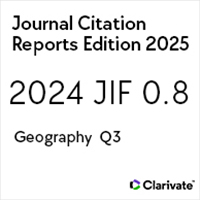The new returnees of Yucatec Maya migration in the United States
Los nuevos retornados de la migración maya yucateca en Estados Unidos
https://doi.org/10.21670/ref.2012054
Keywords:
Return, transnational return, new returnees, migration, MayasAbstract
In this article we analyze the migration of girls and boys of Maya origin from the state of Yucatán who were born in the United States and who emigrated to Mexico with their families when they were minors between the decades of 1990 and 2010; currently, they are new returnees in the United States. Based on the perspective of transnational return, we examine family return to Mexico, return to the United States, and transnational mobility of this generation. We demonstrate that family members and new returnees are transnationally connected in the Peninsula de Yucatan-California-Oregon migratory circuit; that family return to Yucatan is due to family, social, and economic reasons and return to the United States happens for economic, educational, and labor motivation. Finally, we argue that the new returnees integrate in transnational family dynamics to contribute to generational reproduction and family livelihood in California and Yucatan.Resumen
En este artículo investigamos la migración de retorno de niñas y niños de origen maya del estado de Yucatán que nacieron en Estados Unidos, que emigraron a México con sus familias cuando eran menores de edad entre las décadas de 1990 y 2010, y que en la actualidad (2018) son nuevos retornados en Estados Unidos. Con base en la perspectiva del retorno transnacional se analiza el retorno familiar a México, el retorno a Estados Unidos y la movilidad transnacional de esta generación. Se demuestra una gran movilidad familiar en el circuito migratorio península de Yucatán-California-Oregón; el regreso a Yucatán por causas familiares, sociales y económicas; el retorno a Estados Unidos por cuestiones económicas, educativas, y laborales; y, la integración de los nuevos retornados en las dinámicas familiares transnacionales que posibilitan la reproducción generacional y el sustento familiar en California y Yucatán.References
Adler, R. (2004). Yucatecans in Dallas, Texas. Breaching the border. Bridging the distance. (New immigrants series). Allyn & Bacon.
Arias, P. (2013). Migración internacional y cambios familiares en las comunidades de origen: transformaciones y resistencias. Annual Review of Sociology, 39, 1-23. DOI: https://doi.org/10.1146/annurev-soc-071312-145624
Armstrong-Fumero, F. (2009). A heritage of ambiguity: the historical substrate of vernacular multiculturalism in Yucatán, Mexico. American Ethnologist, 36(2), 300-316. DOI: https://doi.org/10.1111/j.1548-1425.2009.01136.x
Baquedano-López, P. (2019). Indigenous Maya families from Yucatán in San Francisco: hemispheric mobility and pedagogies of diaspora. En S. Gleeson & X. Bada (Coord.), Accountability across borders: migrant rights in North America (pp. 515-563). University of Texas Press. DOI: https://doi.org/10.7560/318355-011
Baquedano-López, P. & Borge Janetti, G. (2017). The Maya diaspora Yucatán-San Francisco: new Latino educational practices and possibilities. En S. Salas & P. Portes (Eds.), U.S. latinization: education and the new Latino South (pp. 161-183). SUNY Press.
Barenboim, D. E. (2013). Belonging out of place: Navigating 'illegality' and indigeneity in migrant Maya California (tesis doctoral no publicada). The University of Chicago.
Boehm, D. A. (2012). Intimate migrations. Gender, family and illegality among transnational Mexicans. New York University Press. DOI: https://doi.org/10.18574/nyu/9780814789834.001.0001
Brettell, C. B. (2016). Gender and migration. Polity Press.
Burawoy, M., Blum, J. A., George, S., Thayer, M., Gille, Z., Gowan, T., Haney, L., Klawiter, M., Lopez, S. H. & Riain, S. (2000). Global ethnography: forces, connections, and imaginations in a postmodern world. University of California Press.
Casanova, S. (2011). Ethnic identity, acculturation, and perceived discrimination for indigenous Mexican youth: A cross-cultural comparative study of Yucatec Maya adolescents in the US and México (tesis doctoral no publicada). Stanford University.
Casanova, S. (2016). Conversaciones indígenas desde el otro lado: Adolescentes de origen maya en Estados Unidos. En I. Cornejo Portugal (Ed.), Juventud rural y migración mayahablante: acechar, observar e indagar sobre una temática emergente (pp. 165-201). Universidad Autónoma Metropolitana. http://hermes.cua.uam.mx/repositorio/libros.php?libro=CornejoPortugal-MigracionMayahablante
Cassarino, J. P. (2004). Theorising return migration: The conceptual approach to return migrants revisited. International Journal on Multicultural Societies, 6(2), 253-279. https://hal.archives-ouvertes.fr/hal-01237439/document
Cavalcanti, L. & Parella, S. (2013). El retorno desde una perspectiva transnacional. REMHU. Revista Interdisciplinar da Mobilidade Humana, 21(41), 9-20. DOI: https://doi.org/10.1590/S1980-85852013000200002
Cornejo Portugal, I. & Fortuny Loret de Mola, P. (2011). “Corrías sin saber a dónde ibas”: Proceso migratorio de mayas yucatecos a San Francisco, California. Cultura y Representaciones Sociales, 5(10), 82-106. http://www.scielo.org.mx/scielo.php?script=sci_arttext&pid=S2007-81102011000100004
Cruz-Manjarrez, A. (2013). Zapotecs on the move. Cultural, social, and political processes in transnational perspective. Rutgers University Press.
Cruz-Manjarrez, A. (2016). Transnacionalismo y retorno en una comunidad zapoteca. En E. Levine, S. Núñez & M. Verea (Coords.), Nuevas experiencias de la migración de retorno (pp. 205-226). UNAM, CISAN, SRE, Instituto Matías Romero.
Cruz-Manjarrez, A. (2018, enero-junio). Familias transnacionales de jefatura femenina: maya yucatecas entre California y Yucatán. Antropología Americana, 3(5), 53-72. https://revistasipgh.org/index.php/anam/article/view/121/127
Cruz-Manjarrez, A. (2019). Migración internacional y matrimonio en la experiencia de mujeres mayas yucatecas en California. En G. E. Rodríguez Ceja (Ed.), Pueblos mayas en el siglo XXI. Desigualdades, transformaciones y retos (pp. 23-55). UNAM, Instituto de Investigaciones Filológicas, Centro de Estudios Mayas.
Cruz-Manjarrez, A. & Baquedano-López, P. (2019, 27 de junio). Movilidades, circuitos y actores de la migración de retorno (Simposio: Migración y derechos humanos) [presentación]. XI Congreso Internacional de Mayistas. Tradiciones y reelaboraciones. Chetumal, Quintana Roo, México.
D’Aubeterre Buznego, M. E. (2012, enero-junio). Empezar de nuevo: migración femenina a Estados Unidos. Retornos y reinserción en la Sierra Norte de Puebla, México. Norteamérica, Revista Académica del CISAN-UNAM, 7(1), 149-180. http://www.revistanorteamerica.unam.mx/index.php/nam/article/view/162/147
Dreby, J. (2010). Divided by borders. Mexican migrants and their children. University of California Press. DOI: https://doi.org/10.1525/9780520945838
Durand, J. (2004). Ensayo teórico sobre la migración de retorno. El principio del rendimiento decreciente. Cuadernos Geográficos, 35(2), 103-116. http://www.ugr.es/~cuadgeo/docs/articulos/035/035-006.pdf
Durand, J. & Arias, P. (2014). Escenarios locales del colapso migratorio. Indicios desde los altos de Jalisco. Papeles de Población, 20(81), 9-23. http://www.scielo.org.mx/scielo.php?script=sci_arttext&pid=S1405-74252014000300007&lng=es&tlng=es
Espinosa, V. M. (1998). El dilema del retorno: migración, género y pertenencia en un contexto transnacional. El Colegio de Michoacán/El Colegio de Jalisco.
Faist, T. (2000). The volume and dynamics of international migration and transnational social spaces. Oxford University Press. DOI: https://doi.org/10.1093/acprof:oso/9780198293910.001.0001
Fix, M. & Zimmermann, W. (2001). All under one roof: mixed status families in an era of reform. International Migration Review, 35(2), 397-419. DOI: https://doi.org/10.1111/j.1747-7379.2001.tb00023.x
Fortuny Loret de Mola, P. (2009). Transnational Hetzmek. From Oxkutzcab to San Francisco. En L. A. Lorentzen, J. J. Gonzalez, K. M. Chun & H. Duc Do (Eds.). Religion at the corner of bliss and nirvana. Politics, identity and faith in new migrant communities (pp. 207-242). Duke University Press. DOI: https://doi.org/10.1215/9780822391166-012
Gallo, S. (2018). Toolkit: helping immigrant families navigate migration decisions and schooling in a different country. https://www.colorincolorado.org/toolkit-mexican-schools
Gandini, L., Lozano-Ascencio, F. & Gaspar Olvera, S. (2015). El retorno en el nuevo escenario de la migración entre México y Estados Unidos. Segob, Conapo, Fondo de Población de las Naciones Unidas.
García Zamora, R. & Gaspar Olvera, S. (2017). Migración de retorno de Estados Unidos a seis estados de México. Hacia la reintegración familiar y comunitaria. En R. García Zamora (Ed.), El retorno de los migrantes mexicanos de Estados Unidos a Michoacán, Oaxaca, Zacatecas, Puebla, Guerrero y Chiapas (pp. 15-64). Universidad Autónoma de Zacatecas/MAPorrúa.
Jacobo-Suárez, M. (2017). De regreso a “casa” y sin apostilla: estudiantes mexicoamericanos en México. Sinéctica, (48) http://www.scielo.org.mx/scielo.php?script=sci_arttext&pid=S1665-109X2017000100003&lng=es&tlng=es.
Jensen, B. & Jacobo-Suárez, M. (2019). Integrating American-Mexican students in Mexican classrooms. Kappa Delta Pi Record, 55(1), 36-41. DOI: https://doi.org/10.1080/00228958.2019.1549439
Kearney, M. (2000). Transnational Oaxacan indigenous identity: The case of Mixtecs and Zapotecs. Identities, 7(2), 173-175. DOI: https://doi.org/10.1080/1070289X.2000.9962664
Levitt, P. & Waters, M. C. (2002). The changing face of home: The transnational lives of the second generation. Russell Sage Foundation.
Lewin Fischer, P. (2007). Yucatán as an emerging migrant-sending region. En W. A. Cornelius, D. Fitzgerald & P. Lewin (Eds.), Mayan Journeys. The new migration from the United States (pp. 1-28). Center for Comparative Immigration Studies, UCSD.
Lewin Fischer, P., Guzmán Ayala, E., Rodríguez de la Gala, J. & Manzanero, L. (2012). Las que se quedan. Tendencias y testimonios de migración interna e internacional en Yucatán. Gobierno Federal INM, Gobierno del Estado de Yucatán, Oficina de Asuntos Internacionales de Yucatán, Secretaría de Política Pública Comunitaria y Social, Instituto para la Equidad de Género en Yucatán.
Masferrer, C., Hamilton, E. R. & Denier, N. (2019). Immigrants in their parental homeland: half a million U.S.-born minors settle throughout Mexico. Demography, 56(4), 1453-1461. https://doi.org/10.1007/s13524-019-00788-0 DOI: https://doi.org/10.1007/s13524-019-00788-0
Marcus, G. E. (1995). Ethnography in/of the world system: The emergence of multi-sited ethnography. Annual Review of Anthropology, 24, 95-117. DOI: https://doi.org/10.1146/annurev.an.24.100195.000523
Medina, D. & Menjívar, M. (2015). The context of return migration: challenges of mixed-status families in Mexico's schools. Ethnic and Racial Studies, 38(12), 2123-2139. DOI: https://doi.org/10.1080/01419870.2015.1036091
Mummert, G. (2012). Pensando en las familias transnacionales desde los relatos de vida. En M. Ariza & L. Velasco (Coords.), Métodos cualitativos y su aplicación empírica. Por los caminos de la investigación sobre migración internacional (pp. 151-184). IIS-UNAM, Colef.
Muse-Orlinof, L. (2014). Pioneer entrepreneurs: legal capital and social network changes in a first generation Mexican community (tesis doctoral no publicada). UCSD.
Portes, A. (1996). The new second generation. Russell Sage Foundation.
Rivera Sánchez, L. (2013, julio-diciembre). Migración de retorno y experiencias de la reinserción en la zona metropolitana de la Ciudad de México. REMHU. Revista Interdisciplinar da Mobilidade Humana, 21(41), 55-76. https://www.scielo.br/scielo.php?script=sci_arttext&pid=S1980-85852013000200004 DOI: https://doi.org/10.1590/S1980-85852013000200004
Robichaux, D. (2003). El matrimonio en Mesoamérica ayer y hoy. En D. Robichaux (Comp.), El matrimonio en Mesoamérica ayer y hoy. Una mirada antropológica (pp. 13-54). Universidad Iberoamericana.
Salazar-Parreñas, R. (2005). Children of global migration. Transnational families and gendered woes. Stanford University Press. DOI: https://doi.org/10.1515/9781503624627
Scott, J. (2013). El género una categoría útil para el análisis histórico. En M. Lamas (Coord.), El género: la construcción cultural de la diferencia sexual (pp. 264-302). Porrúa, UNAM, PUEG.
Solis Lizama, M. (2017). Desde el corazón del Puuc: Narrativas de retorno de migrantes yucatecos. Península, 12(2), 119-142. https://doi.org/10.1016/j.pnsla.2017.06.006 DOI: https://doi.org/10.1016/j.pnsla.2017.06.006
Solis Lizama, M. (2018). Reinserción laboral de migrantes de retorno en dos comunidades rurales de Yucatán, México. Migraciones Internacionales, 9(35), 185-212. http://dx.doi.org/10.17428/rmi.v9i35.416
West, C. & Zimmerman, D. H. (1987, junio). Doing gender. Gender and Society, 1(2), 125-151. https://www.gla.ac.uk/0t4/crcees/files/summerschool/readings/WestZimmerman_1987_DoingGender.pdf DOI: https://doi.org/10.1177/0891243287001002002
Zúñiga, V. (2013, enero-junio). Migrantes internacionales en las escuelas mexicanas: desafíos actuales y futuros de política educativa. Sinéctica, 40. https://sinectica.iteso.mx/index.php/SINECTICA/article/view/50/42
































